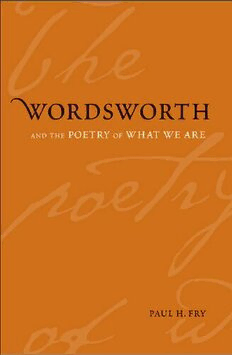
Wordsworth and the Poetry of What We Are PDF
Preview Wordsworth and the Poetry of What We Are
Yale Studies in English Yale Studies in English publishes books on English, American, and Anglophone literature developed in and by the Yale University community. Founded in 1898 by Albert Stanburrough Cook, the original series continued into the 1970s, producing such titles as The Poetry of Meditation by Louis Martz, Shelley’s Mythmaking by Harold Bloom, The Cankered Muse by Alvin Kernan, The Hero of the Waverly Novels by Alexander Welsh, John Skelton’s Poetry by Stanley Fish, and Sir Walter Ralegh: The Renaissance Man and His Roles by Stephen Greenblatt. With the goal of encouraging publications by emerging scholars alongside the work of estab- lished colleagues, the series has been revived for the twenty-first century with the support of a grant from the Andrew W. Mellon Foundation and in partnership with Yale University Press. PA U L H . F RY Wordsworth and the Poetry of What We Are Yale University Press New Haven & London Published with assistance from the Louis Stern Memorial Fund. Copyright ∫ 2008 by Yale University. All rights reserved. This book may not be reproduced, in whole or in part, including illustrations, in any form (beyond that copying permitted by Sections 107 and 108 of the U.S. Copyright Law and except by reviewers for the public press), without written permission from the publishers. Set in Sabon by Keystone Typesetting, Inc. Printed in the United States of America. Library of Congress Cataloging-in-Publication Data Fry, Paul H. Wordsworth and the poetry of what we are / Paul H. Fry. p. cm. — (Yale studies in English) Includes bibliographical references and index. isbn 978-0-300-12648-8 (cloth : alk. paper) 1. Wordsworth, William, 1770–1850—Criticism and interpretation. 2. Wordsworth, William, 1770–1850—Philosophy. 3. Coleridge, Samuel Taylor, 1772–1834—Philosophy. 4. Philosophy, English—19th century. 5. Philosophical anthropology in literature. 6. Philosophy of nature in literature. 7. Philosophy in literature. 8. Nature in literature. I. Title. pr5892.p5f79 2008 821%.7—dc22 2007046556 A catalogue record for this book is available from the British Library. The paper in this book meets the guidelines for permanence and durability of the Committee on Production Guidelines for Book Longevity of the Council on Library Resources. 10 9 8 7 6 5 4 3 2 1 To the memory of my parents, Jess and Ann Fry, Wordsworthian lives in their diurnal course This page intentionally left blank Contents Preface ix Acknowledgments xv 1. Introduction: Wordsworth’s Originality 1 2. Wordsworth in the Rime 23 3. Jeffreyism, Byron’s Wordsworth, and the Nonhuman in Nature 42 4. Green to the Very Door? The Natural Wordsworth 60 5. The Novelty of Wordsworth’s Earliest Poems 75 6. Hoof After Hoof, Metric Time 91 7. The Poem to Coleridge 119 8. The Pastor’s Wife and the Wanderer: Spousal Verse or the Mind’s Excursive Power 146 9. Intimations Revisited: From the Crisis Lyrics to Wordsworth in 1817 176 Afterword: Just Having It There Before Us 200 Notes 205 Index 226 vii This page intentionally left blank Preface Introducing a reprint of the 1835 edition of Wordsworth’s Guide to the Lakes, the Malvern Public Librarian nicely says that Wordsworth’s ‘‘great prefaces . . . strive, with characteristic humility, to seek out the hiding-places of his power.’’ Not just the prefaces, of course, and not just his own power: Wordsworth had a way of sensing the power hidden in all poetry, and never stopped writing about it. At the same time, however, he believed that his own peculiar power, like that of a handful of predecessors, was original, and that his originality was what mattered. In this book it is my wish to bring the hiding-places of Wordsworth’s original power to light in the poetry that was written as early as 1787 and as late as 1817. My title alludes to the impassioned declaration of purpose in the ‘‘Prospec- tus to The Recluse.’’ Having passed in review the great myths of traditional poetry, especially Milton’s, Wordsworth claims that his own poetry will en- courage ‘‘the discerning intellect of Man’’ to find such myths implied, or en- tailed, as ‘‘[a] simple produce of the common day.’’ Raising his pitch still higher, he proposes to ‘‘chant . . . the spousal verse’’ of mind and nature, using ‘‘words / Which speak of nothing more than what we are.’’ I shall add a word about the continuation of this passage below, but for the moment I want to call attention to a choice of words in which the theme of my book can be found. Wordsworth might have said ‘‘who we are.’’ Agreed, ‘‘nothing more than who ix
